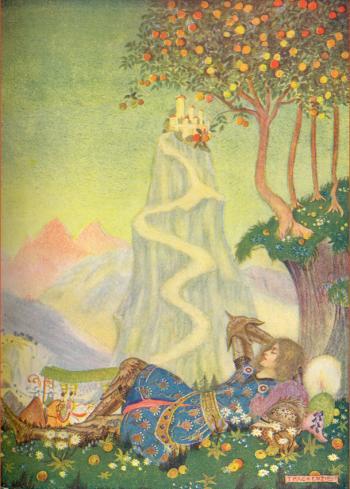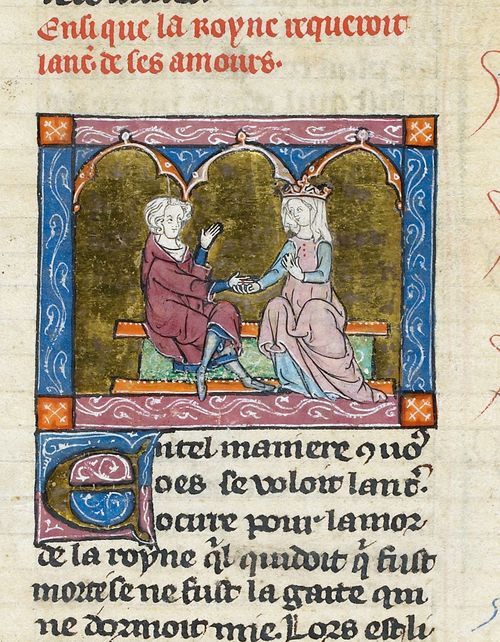#belleus' wife
Explore tagged Tumblr posts
Text
Is Lancelot a queer icon? A character analysis!
Hello noble readers, and buckle up for a long post. This time, we’ll be talking about Lancelot du Lake–arguably one of the most famous knights of the Round Table. Normally when we talk about Lancelot, we’re talking about his devout, somewhat insane love affair with Guinevere. But instead of that, we’re going to discuss a particular story in which Lancelot goes through some queering events. This post is about Sir Thomas Malory’s “The Noble Tale of Sir Launcelot du Lake”, and all the ways in which Lancelot is characterized as a queer character.

First up, we have to talk about the scene with the four queens in this story. If you’re unfamiliar with it, this is the part where Lancelot is just sleeping in the woods (???) and these four beautiful queens basically kidnap him, bring him to a castle chamber, and force him to take one of them as his lover. That’s not the weirdest thing to happen in medieval literature (looking at you, Wheel of Fortune), but the weirder part is Lancelot’s response. He says that he would rather die than choose one of them. Refusing women when they offer themselves to him is significant; he’s the most famous knight in the land but, time after time, he keeps on saying that he doesn’t want to take a wife or lover. An important side note here is that his relationship with Guinevere has not been established yet–in this story, he’s a single man! Lancelot choosing to reject all four of those beautiful, powerful queens is an important queer aspect of his character; he is alone and unattached even though he has the opportunity not to be.
This leads into our next point–Lancelot explaining why he doesn’t want a wife or even a paramour. He first says that all the rumors about him shacking up with Guinevere are completely false. Then, he adamantly states that a wife would only hold him back from participating in tournaments, jousts, battles, and adventures. He also says that having a paramour just feels wrong to him and would only make him a worse knight. Basically, Lancelot says a lot of not-so-nice things about women here; they’ll only hold him back, he’s stronger without them, etc. But if we combine that with his refusal earlier, the queer aspects of his character start to add up. He will actively refuse women over and over again because, unlike basically every other knight out there, he doesn’t see the need to have his own wife. It leaves him in a weird position; he isn’t acting like any of the other knights we so often read about–he isn’t even acting like the version of himself we’re familiar with from other iterations of Arthurian stories. In those, he is devoted to Guinevere; he fights battles for her, gives her presents, and constantly has to prove his love. Here, he’s a lone knight, wandering from battle to battle–his more significant interactions are with fellow knights, leaving women behind entirely.

This leads into our final point about Lancelot’s queering in this story; his interactions with male characters! Towards the beginning of the story, Lancelot seeks shelter for the night in a random pavilion (basically a tent). Unbeknownst to him, the pavilion belongs to Sir Belleus, who misrecognizes Lancelot as his lady and starts to kiss him as Lancelot is sleeping! This one is just plain obvious; Lancelot was both misgendered and was kissed by another man. If that’s not a sign of literary queering, then I don’t know what is, so let’s move on. Later, Lancelot spends the night with Sir Kay–while their sharing of a bed may seem like queering, this was actually commonly done and totally nonsexual, so we’ll skip it. The more important part of this glorified sleepover is that Lancelot switches his armor, shield, and horse with Kay. These are all essential to masculinity, so sharing armor is a somewhat intimate thing. Based on what we've already seen with Lancelot, this level of trust and intimacy is something he doesn’t want with women and can thus only have with men.
So, we’ve talked about the queer aspects of Lancelot’s character in this story. He rejects women who offer themselves to him, hates the idea of being bound to a wife, and seems to have his closest relationships and interactions with men. It’s certainly different from the Guinevere-obsessed Lancelot we’re used to. Lancelot comes off as eccentric and even weird in this story–we didn’t even mention the part where he strips down to his underwear to climb up a tree. But since, in many other Arthurian stories, a knight’s masculinity seems to be supported by his lady, this separates Lancelot from others. In this story, at least, his gender construction doesn’t stay strictly within the binary and his motives and actions become harder to understand.
First image: Thomas Mackenzie, 1920
Second image: Miniature of Lancelot and Guinevere, north-eastern France or Flanders (St Omer or Tournai), 1316
#arthur pendragon#gawain#guenevere#king arthur#medieval literature#round table#lancelot#lancelot du lac#booklr#books#medieval art#medieval#middle ages#15th century#medieval history#historical#bookworm#book quotes#books & libraries#bookblr#reading#books and reading#book review#bookstagram#queer#queen#queer community
5 notes
·
View notes
Text
By the way, on my soirée into the fascinating world of King Arthur, I learnt many things. One is that Lancelot is just inherently a ridiculous character. Don't believe me? Allow me to tell you the story of how Sir Belleus joined the Round Table...
(Source is Phyllis Ann Karr's Arthurian Companion, which itself cites Morte d'Arthur)
So, Lancelot was riding along one day, it was getting a bit late so he was getting tired. He comes across a pavilion, kind of like a portable bed the nobility used carried around by servants. There doesn't appear to be anyone around, so Lancelot just... gets in the bed. Apparently this was a thing he keeps doing in Mallory. Lancelot I think you have a bit of a problem.
So, it turns out that, shocker, the really expensive bed lying in the middle of the road actually belongs to someone, namely a Knight named Sir Belleus. He comes back from his business, sees someone sleeping in his bed, and assumes it's his wife, which leads us to two conclusions:
Sir Belleus is blind and can't notice the person in his bed is clearly a man
Lancelot is such a Bishonen that he's easily mistaken for a girl, as evidenced by the fact that this KEEPS HAPPENING
(in case it's not clear, I'm hoping for the latter)
So, Belleus gets into his bed and starts spooning with the person he thinks is his wife. Lancelot (who in this equation is the little spoon, this is canon, fuck off) responds by 'no-homo'ing so hard he STABS BELLUS IN THE STOMACH. WOW. THAT'S LIKE GREEK TRAGEDY LEVELS OF MISUNDERSTANDING MY FRIEND.
Fortunately for both Belleus and the reader, Lancelot is spared another soliloquy about how sorry he is at killing somebody by the timely arrival of Sir Belleus' wife, who has several questions:
Who the fuck are you.
Why the FUCK are you in my husband's bed.
OH MY GOD WHY THE FUCK HAVE YOU STABBED MY HUSBAND!
Lancelot, in that great British tradition, starts compulsively apologising for everything he's ever done, and Belleus himself says that 'this knight is a good man', which is kind of a leap given the only interaction you've had with him is him stabbing you, but okay. The lady, being naturally sceptical of the man who just stabbed her husband, demands to know his name, and even though Lancelot is travelling incognito (because for some reason no one wants to fight him once he introduces himself as Lancelot) tells them his real identity, and the lady*, being a shrewd businesswoman (because this is the Middle-Dark Ages and every noblewoman is a shrewd businesswoman) tells him that they'll forgive the stabbing thing as long as Lancelot agrees to make Belleus a Knight of the Round Table. Lancelot, who is very familiar with the fact that people have been made Knights for worse reasons, agrees, and they both part ways.
Now, I'm not saying that this wouldn't be out of place in Monty Python and the Holy Grail, but I know it wouldn't be because it isn't:
youtube
Again I must bring up: one of the Pythons was literally an Arthurian scholar. This, rather ironically, makes The Holy Grail one of the most accurate depictions of at least Le Morte d'Arthur in modern cinema, and that will never stop being hilarious.
*she's never named, although, this being the Arthurian mythos, there's a non-zero chance she's called Elaine
#king arthur#arthurian mythology#arthurian legend#arthuriana#monty python#monty python and the holy grail#lancelot#belleus#belleus' wife#hilarity#mishaps#japes and stabbings
128 notes
·
View notes